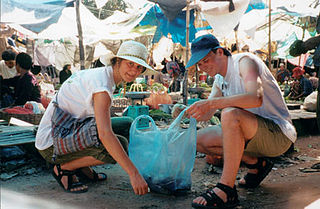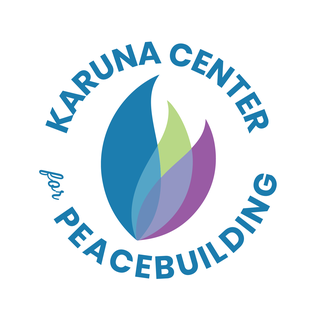Related Research Articles

Mediation is a structured, interactive process where an impartial third party neutrally assists disputing parties in resolving conflict through the use of specialized communication and negotiation techniques. All participants in mediation are encouraged to actively participate in the process. Mediation is a "party-centered" process in that it is focused primarily upon the needs, rights, and interests of the parties. The mediator uses a wide variety of techniques to guide the process in a constructive direction and to help the parties find their optimal solution. A mediator is facilitative in that they manage the interaction between parties and facilitates open communication. Mediation is also evaluative in that the mediator analyzes issues and relevant norms ("reality-testing"), while refraining from providing prescriptive advice to the parties.

Arab–Israeli peace projects are projects to promote peace and understanding between the Arab League and Israel in different spheres. These are part of a broader attempt at a peace process between Palestinians and Israelis. Sponsors of such projects can be found both in Israel and Palestine.

Restorative justice is an approach to justice that aims to get offenders to take responsibility for their actions, to understand the harm they have caused, to give them an opportunity to redeem themselves, and to discourage them from causing further harm. For victims, its goal is to give them an active role in the process and to reduce feelings of anxiety and powerlessness.

Sing Sing Correctional Facility, formerly Ossining Correctional Facility, is a maximum-security prison operated by the New York State Department of Corrections and Community Supervision in the village of Ossining, New York. It is about 30 miles (48 km) north of New York City on the east bank of the Hudson River. It holds about 1,700 inmates and housed the execution chamber for the State of New York until the abolition of capital punishment in New York in 2004.

Nonviolent Communication (NVC) is an approach to communication that is claimed to be based on principles of nonviolence. It is not an attempt to end disagreements, but rather a method that is claimed to increase empathy and improve the quality of life of those who utilize the method and the people around them. Nonviolent Communication evolved from concepts used in person-centered therapy, and was developed by clinical psychologist Marshall Rosenberg beginning in the 1960s and 1970s. There are a large number of workshops and clinical materials about NVC, including Rosenberg's book Nonviolent Communication: A Language of Life. Marshall Rosenberg also taught NVC in a number of video lectures available online; the workshop recorded in San Francisco is the most well-known.

Recidivism is the act of a person repeating an undesirable behavior after they have experienced negative consequences of that behavior. It is also used to refer to the percentage of former prisoners who are rearrested for a similar offense.

ISFiT - The International Student Festival in Trondheim, Norway is allegedly the world's largest student festival with a thematic emphasis. Approximately 450 students from all over the world attend the festival. The themes change with each festival, but have always been related to social and political topics with international relevance.

Drug courts are problem-solving courts that take a public health approach to criminal offending using a specialized model in which the judiciary, prosecution, defense bar, probation, law enforcement, mental health, social service, and treatment communities work together to help addicted offenders into long-term recovery. Instead of punishment, their purpose is to address one of the underlying drivers of crime and, in the process, reduce the use of imprisonment, potentially leading to substantial cost-savings. Drug courts aim to do this by incentivizing or mandating offenders into addiction treatment combined with frequent drug testing and regular monitoring by the judge.

Service Civil International (SCI) is an international peace organisation, founded by Swiss pacifist Pierre Cérésole in the aftermath of World War I to foster understanding and a culture of peace between people from different countries. Since 1920 SCI has organised international volunteering projects in the form of workcamps and has expanded to have branches in 40 countries, as well as partner organisations who help run the projects.
Peace education is the process of acquiring values, knowledge, attitudes, skills, and behaviors to live in harmony with oneself, others, and the natural environment.

Valley State Prison (VSP), previously the Valley State Prison for Women (VSPW), is a state prison in Chowchilla, California. It is across the road from Central California Women's Facility. It was formerly a prison for women.

The Fund for Peace is an American non-profit, non-governmental research and educational institution. Founded in 1957, FFP "works to prevent violent conflict and promote sustainable security."
Prison contemplative programs are classes or practices that are offered at correctional institutions for inmates and prison staff. There are measured or anecdotally reported benefits from studies of these programs such a stress relief for inmates and staff. These programs are gaining in acceptance in North America and Europe but are not mainstream.

A prison, also known as a jail, gaol, penitentiary, detention center, correction center, correctional facility, lock-up, hoosegow or remand center, is a facility in which convicted criminals are confined against their will and denied a variety of freedoms under the authority of the state as punishment for various crimes. Prisons are most commonly used within a criminal justice system: people charged with crimes may be imprisoned until their trial; those pleading or being found guilty of crimes at trial may be sentenced to a specified period of imprisonment. In simplest terms, a prison can also be described as a building in which people are legally held as a punishment for a crime they have committed.
New York Yearly Meeting of the Religious Society of Friends, or simply New York Yearly Meeting or NYYM, is the central organizing body for Quaker meetings and worship groups in New York State, northern and central New Jersey, and southwestern Connecticut.

Karuna Center for Peacebuilding (KCP) is a 501(c)(3) non-profit organization based in Amherst, Massachusetts. The stated mission of KCP is to empower people divided by conflict to develop mutual understanding and to create sustainable peace. The organization was named for the Sanskrit word for compassion. The organizations efforts in facilitating "post-conflict reconciliation" has led to active programs in more than 30 countries. They have co-implemented programs with the United States Agency for International Development, United States Department of State, United States Institute of Peace, and Fund for Peace, among others.

Center for Peacebuilding is a non-governmental organization based in Sanski Most, Una-Sana Canton, Bosnia-Herzegovina. The organization was founded in 2004 to address the ethnic divisions present in Bosnia-Herzegovina.

The Canadian Friends Service Committee (CFSC) is a charity that acts on the peace and social justice concerns of the Religious Society of Friends (Quakers) in Canada.
United States Fellowship of Reconciliation was founded in 1915 by sixty-eight pacifists, including A. J. Muste, Jane Addams and Bishop Paul Jones, and claims to be the "largest, oldest interfaith peace and justice organization in the United States." Norman Thomas, at first skeptical of its program, joined in 1916 and would become the group's president. Its programs and projects involve domestic as well as international issues, and generally emphasize nonviolent alternatives to conflict and the rights of conscience. Unlike the U.K. movements, it is an interfaith body, though its historic roots are in Christianity. Both the FOR in the United States and similarly-named organizations in other countries are affiliated with the International Fellowship of Reconciliation.
References
- ↑ "Delahanty, Summary of research on effectiveness of AVP (2004)" (PDF). Archived from the original (PDF) on 2011-07-22. Retrieved 2011-05-31.
- ↑ "AVP/USA, Inc. -". AVP/USA, Inc.
- ↑ Walrath, Evaluation of an Inmate-Run Alternatives to Violence Project Archived 2011-08-12 at the Wayback Machine , JOURNAL OF INTERPERSONAL VIOLENCE, Vol. 16 No. 7, July 2001 697–711
- ↑ "Tomlinson A review of the literature concerning the Alternatives to Violence Project (AVP) (2007)" (PDF). Archived from the original (PDF) on 2011-07-22. Retrieved 2011-05-31.
- ↑ "Help Increase the Peace (HIPP) Program – PEACE in Action". promotingpeace.org.
- ↑ Coggins, HIP Middle School Program evaluation (2005) Archived 2011-08-12 at the Wayback Machine
- ↑ Hoppe, Creative Conflict Resolution Outcome Study (2001) Archived 2011-08-12 at the Wayback Machine
- ↑ Miller, Delaware Recidivism Study (2005) Archived 2011-08-12 at the Wayback Machine
- ↑ "Sloane, A Study of the Effectiveness of the Alternatives to Violence Project Workshops in a Prison System (2002)" (PDF). Archived from the original (PDF) on 2011-09-04. Retrieved 2011-05-31.
- ↑ "AVP: An Instrument of Peace". Friends Journal.